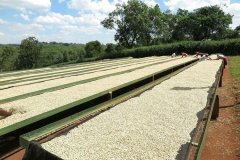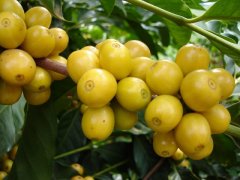Columbia Coffee Manor Colombia's most expensive Coffee-Colombian Palm and Big Bird LPET

For professional baristas, please follow the coffee workshop (Wechat official account cafe_style)
Completely different from ordinary Colombia, they assist nearby farmers to deal with cherries and adopt a very special treatment under strict control. Different microorganisms are fermented with lactic acid and acetic acid to produce different flavor spectrum. although there is nothing special about farmers' beans, the coffee produced has the characteristics rarely seen in Colombia. The farmers who work with them are also paid more, and this year WBC Italian players use big beaked birds as race beans to reach the semi-finals.
Last year, the team spent four months in LPET to investigate and document the daily life and coffee harvest of nearby small farmers who participated in the LPET-launched "Neighbors and Crops" project, which creates added value and develops complex flavors and amazing tastes by emphasizing the importance of fermentation.
The Community crop Project is a farm project driven by Palm and Big Bird (La Palma y El Tucan,LPET), located in Cundinamarca, Colombia, a few hours' drive from Bogota. The project usually includes a small farm, excellent cherries, and a central processing plant run by LPET. LPET processes cherries from 100 small farmers around them to help them produce first-class coffee. After obtaining excellent coffee cherries from farmers within a radius of 10 kilometers, they can use both anaerobic and aerobic fermentation procedures with highly skilled control and innovative fermentation methods, so that both acetic acid bacteria and lactic acid bacteria can play an appropriate role and develop different flavors.

LPET itself is a processing plant, as well as its own farm, located in the eastern foothills of the Colombian Andes, built by three founders, Elisa Madrinan, Felipe Sardi and Carlos Arevalo. The microclimate and environmental conditions in the Cundinamarca producing area are excellent, with an average temperature of 21 °C and a relative humidity of 75%, with at least 1600 hours of sunshine in a year. These conditions make an ecosystem with excellent biodiversity and are very suitable for growing high-altitude boutique coffee.
The fermentation time of this coffee is as long as 90 hours. in the process of fermentation, higher lactic acid microorganisms are created using an anaerobic process, and the production of lactic acid microbacteria comes from the fermentation of carbohydrates in the pulp mucus, thus changing the sensory flavor of coffee. The final flavor is stronger, sweeter, with chocolate and cream taste, plus wine acidity, silk taste.
Introduction to Coffee beans washed by Cundinamaka Palm and Big Bird in Colombia
Colombia Cundinamarca La Palma & El Tucan washed
Country of production: Colombia, Colombia
Producing area: Cundinamaka Cundinamarca
Water washing Plant: Palm and Big Bird LPET;La Palma & El Tucan
Beans: Kaddura Caturra, Colombia Colombia, Kaduai Catuai
Treatment: washing Washed with lactic acid fermentation water
Harvest time: July 2017
Important Notice :
前街咖啡 FrontStreet Coffee has moved to new addredd:
FrontStreet Coffee Address: 315,Donghua East Road,GuangZhou
Tel:020 38364473
- Prev

Introduction to the flavor and taste of red cherry project Wottuna Boltuma Watima washed coffee beans
Professional baristas please follow the coffee workshop (Wechat official account cafe_style) operation Cherrie Red "Red Cherry Initiative" (ORC) is a project to improve the quality of small-scale farms, mainly to encourage soybean farmers and surprise roasters. Trabocca, the largest coffee bean seller in the Netherlands, invited all Ethiopian farms to produce small quantities for them before the harvest season.
- Next

Introduction of Ethiopian Red Cherry Project Kebado Cambedo Sun Sidamo Coffee Flavor
For professional baristas, please follow the coffee workshop (Wechat official account cafe_style) Ethiopian Red Cherry Project Kebado Cambedo Sun Bean operation Cherrie Red "Red Cherry Initiative" (ORC) is a project to improve the quality of small-scale farms, mainly to encourage soybean farmers and surprise roasters. Trabocca, the largest coffee bean seller in the Netherlands, invited the company before the harvest season.
Related
- Detailed explanation of Jadeite planting Land in Panamanian Jadeite Manor introduction to the grading system of Jadeite competitive bidding, Red bid, Green bid and Rose Summer
- Story of Coffee planting in Brenka region of Costa Rica Stonehenge Manor anaerobic heavy honey treatment of flavor mouth
- What's on the barrel of Blue Mountain Coffee beans?
- Can American coffee also pull flowers? How to use hot American style to pull out a good-looking pattern?
- Can you make a cold extract with coffee beans? What is the right proportion for cold-extracted coffee formula?
- Indonesian PWN Gold Mandrine Coffee Origin Features Flavor How to Chong? Mandolin coffee is American.
- A brief introduction to the flavor characteristics of Brazilian yellow bourbon coffee beans
- What is the effect of different water quality on the flavor of cold-extracted coffee? What kind of water is best for brewing coffee?
- Why do you think of Rose Summer whenever you mention Panamanian coffee?
- Introduction to the characteristics of authentic blue mountain coffee bean producing areas? What is the CIB Coffee Authority in Jamaica?

